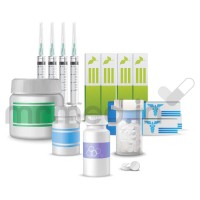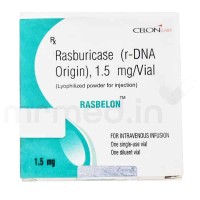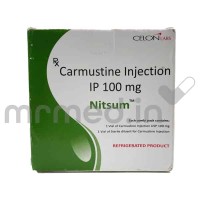Amfy 50mg injection contains the active substance Liposomal Amphotericin B. It is an antifungal antibiotic. It is used to treat fungal infections of one or more deep body organs. It is also used to treat suspected fungal infections in patients with a raised temperature and neutropenia (reduced number of white blood cells). It is also indicated to treat visceral leishmaniasis, a disease caused by a parasite in certain people.
Before initiating your first treatment, your physician may give you a small amount of Amfy 50mg injection to check for allergic reactions. Do not receive this injection if you are allergic to amphotericin B or any of the other ingredients in the medicine. Inform your physician if you have a severe allergic reaction, kidney or liver problems, and if you are having dialysis. Tell your doctor if you have low potassium levels.
This medicine contains sugar in each vial; tell your doctor if you have diabetes. Inform your physician if you are pregnant or breastfeeding before initiating the treatment. The most common side effects of Amfy 50mg injection are skin rash, low potassium levels, diarrhea, anemia, insomnia, and shortness of breath. This medicine is not recommended for babies under 1 month old.
Therapeutic Effects of Amfy 50mg Injection
Pregnancy
Inform your physician if you are pregnant, suspect pregnancy, or planning to become pregnant before receiving Amfy 50mg injection.
Breast Feeding
It is unknown whether Amfy 50mg injection is safe for breastfeeding women. Inform your physician if you are breastfeeding before initiating the treatment.
Lungs
It is unknown whether Amfy 50mg injection can be used in patients with liver disorders. Consult your doctor if you have any liver problems before starting the treatment.
Liver
It is unknown whether Amfy 50mg injection can be used in patients with lung disorders. Consult your doctor if you have any lung diseases before starting the treatment.
Alcohol
It is unknown whether consuming alcohol is safe during the treatment with Amfy 50mg injection. Inform your doctor if you are a chronic drinker.
Driving
Amfy 50mg injection may affect your ability to drive and operate machinery. Do not drive or use heavy machinery during the treatment.
Common
- Skin rash
- Increased blood sugar levels
- Decreased potassium levels
- Diarrhea
- Nausea, vomiting
- Anemia
- Insomnia
- Shortness of breath
- Fever, chills or shivering
Serious
- Cardia arrest
- GI bleeding
- Severe skin reactions
- Acute kidney injury
Amfy 50mg injection is a medication used to treat severe fungal infections, such as invasive or systemic fungal infections. It is a lipid-based formulation of Amphotericin B, designed to enhance drug delivery and minimize side effects.
While Amfy 50mg injection is generally well-tolerated, it can still have side effects. Common side effects may include fever, chills, headache, nausea, vomiting, increased blood sugar levels, muscle or joint pain, and infusion-related reactions. In rare cases, it may cause more serious side effects such as cardiac arrest, kidney damage or allergic reactions.
Amfy 50mg injection can be used in babies more than 1 years old, but the dosage and administration may vary depending on the child's age, weight, and specific medical condition. It is crucial to follow the healthcare provider's instructions and closely monitor the child's response to treatment.
Amfy 50mg injection is less toxic because it is less nephrotoxic. Low toxicity of this medicine may be due to the small number of binding receptors in the drug.
One of the key advantages of Amfy 50mg injection is its lower toxicity compared to conventional Amphotericin B. This makes it a preferred choice, especially for patients more susceptible to antifungal medications' side effects. Additionally, Amfy 50mg injection has a prolonged circulation time in the body, allowing for less frequent dosing.
Molecule name: Liposomal Amphotericin B | Therapeutic class: Antibiotic |
Pharmacological class: Antifungals | Indications: 1. Fungal infections of one or more deep organs of the body 2. Suspected fungal infections 3. Visceral leishmaniasis |








